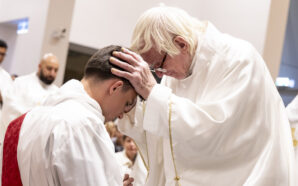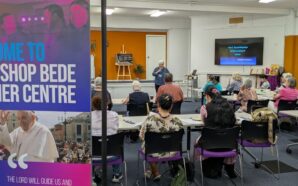Six women have had a profound influence on the church of their own time, and what they taught, as well as how they lived, touches our lives today. What they have demonstrated is the courage and inspiration demanded of a prophet: and each was a prophet; all were saints and three have been declared doctors of the church.
There is a certain irony in these stories in the sense that it was the Magisterium which conferred the honour of doctorates and canonisation, and yet, it was also clergy against whom they needed to struggle – whom they challenged and taught. The struggles these women had, especially with some clerics, were the struggles that other clerics then honoured them for.
There were amazing clerics and lay men who had the sensitivity and humility, the openness and the depth to be able to see the greatness of the message of these women prophets. Today, I believe and know from experience, that there are many such men in our church today and I thank God for them.
My desire in meandering through these centuries, seeking to connect with these women saints whom I encountered, was to probe their wisdom in order to hear that which could speak to us today as we move forward from the Plenary. The struggles they faced are the struggles we face, albeit in a different sociological and ecclesiological milieu.
Probably what stands out as a feature of each of their lives is the courage of their convictions and their willingness to confront clerical misuse of power: not clerical power as such, but clerical misuse of power, hardheartedness and misogyny. As well, they sought to introduce and encourage the use mercy and compassion over strictures based on laws that failed to take into account human weakness and need.
What the women we have met in these reflections were not seeking was power for themselves. They were seeking truth and justice and integrity within the hierarchical Church. They sought and fought for a culture where mercy triumphs over judgment and where compassion for human weakness is at the forefront of ministry. None of them was interested in becoming a priest or deacon. None of them actively sought leadership roles. Instead, what they did was pursue a deep relationship with the person of Jesus Christ to such a degree that they were very sure of the way ahead, albeit one step at a time and often amidst great suffering. In this way, they became, sometimes reluctantly, leaders and reformers.
Do we have such women in the Church today? Undoubtedly. However, my own experience is that many women are also walking away, feeling unheard, abandoned and discarded. These are ordinary women who in the past have been the backbone of their parishes, women whom I know personally and love as sisters and friends. I know the quality of their relationship with God and their grief at feeling they no longer have a spiritual home. Their cry for help and guidance as their children embrace mores that clash with Church teaching, has been ignored. They are disheartened. It is reprehensible that they are left bereft and abandoned.
Is there someone who is speaking in their behalf today I wondered? One name comes immediately to mind – that of Sr Joan Chittister OSB, a Benedictine nun in her 80s who is perhaps a prophet for our time. Will she be heard, I wonder?
Sr Antonia Curtis OSB is a member of the Benedictine Sisters community at Jamberoo Abbey, NSW.
Catholic Outlook thanks Sr Antonia for providing us with these six reflections on the gifts of women in the history of the Catholic Church.
You can read the full series below:
- Gifts from the past – St Teresa of Ávila
- Gifts from the Past – St Scholastica of Nursia
- Gifts from the Past – Saints Hilda of Whitby and Hildegard of Bingen
- Gifts from the Past – St Catherine of Siena
- Gifts from the past – St Mary of the Cross MacKillop








